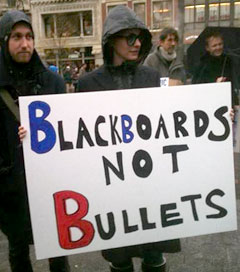If the US fought for the post-carbon economy the way it fights for nebulous state-building goals in foreign wars, the future would be brighter, cleaner, safer and cheaper, with more jobs and perhaps – because it would need to secure less of that foreign oil – fewer wars. If the country built new classrooms with the same urgency it built armored vehicles, more American teens could be choosing between colleges instead of choosing between minimum and subminimum wage jobs – and fewer would eventually need public assistance.
If the government spent more on blackboards and less on bullets, it would create more jobs today and more innovation in the future.
Neither the military nor the marketplace has proven to be the great incubator of innovation that proponents of defense spending and free markets wish to believe. Instead, both facilitate what author Malcolm Gladwell calls “tinkering” – refinements that might improve upon a big invention, rather than the big invention itself. This is not to slight tinkering: Edison's light bulb and Apple's iPod represent the kind of tinkering that can markedly affect everyday life. But those were improvements on earlier discoveries, not the world-changing discoveries, themselves (and, as has been demonstrated, not every tinkering innovation is for the benefit of the end-user).
No, if the United States truly wants to “think different” (as Apple's advertising once implored), it needs to once again embrace the innovations upon which the country was founded: Real representative democracy; transparency; accountability; checks and balances of three co-equal branches of government; no taxation without representation; trial by jury; a wariness of foreign military entanglements; and, as was added soon after Independence, access to free public education as a right. They are ideals remarkably similar to those embraced by the Occupy movement – if not assumed by most Americans to be part of their national identity.
But they are precepts that have been tarnished by the masters of the marketplace and the adherents of the military-industrial complex. Perhaps they don't need reinvention, but it appears some serious rededication is in order. If the innovation in public discourse known as Occupy Wall Street can continue to reframe the crisis, rethink the role of government and reinvigorate the democracy, then maybe America can reoccupy itself.
Join us in defending the truth before it’s too late
The future of independent journalism is uncertain, and the consequences of losing it are too grave to ignore. To ensure Truthout remains safe, strong, and free, we need to raise $43,000 in the next 6 days. Every dollar raised goes directly toward the costs of producing news you can trust.
Please give what you can — because by supporting us with a tax-deductible donation, you’re not just preserving a source of news, you’re helping to safeguard what’s left of our democracy.
